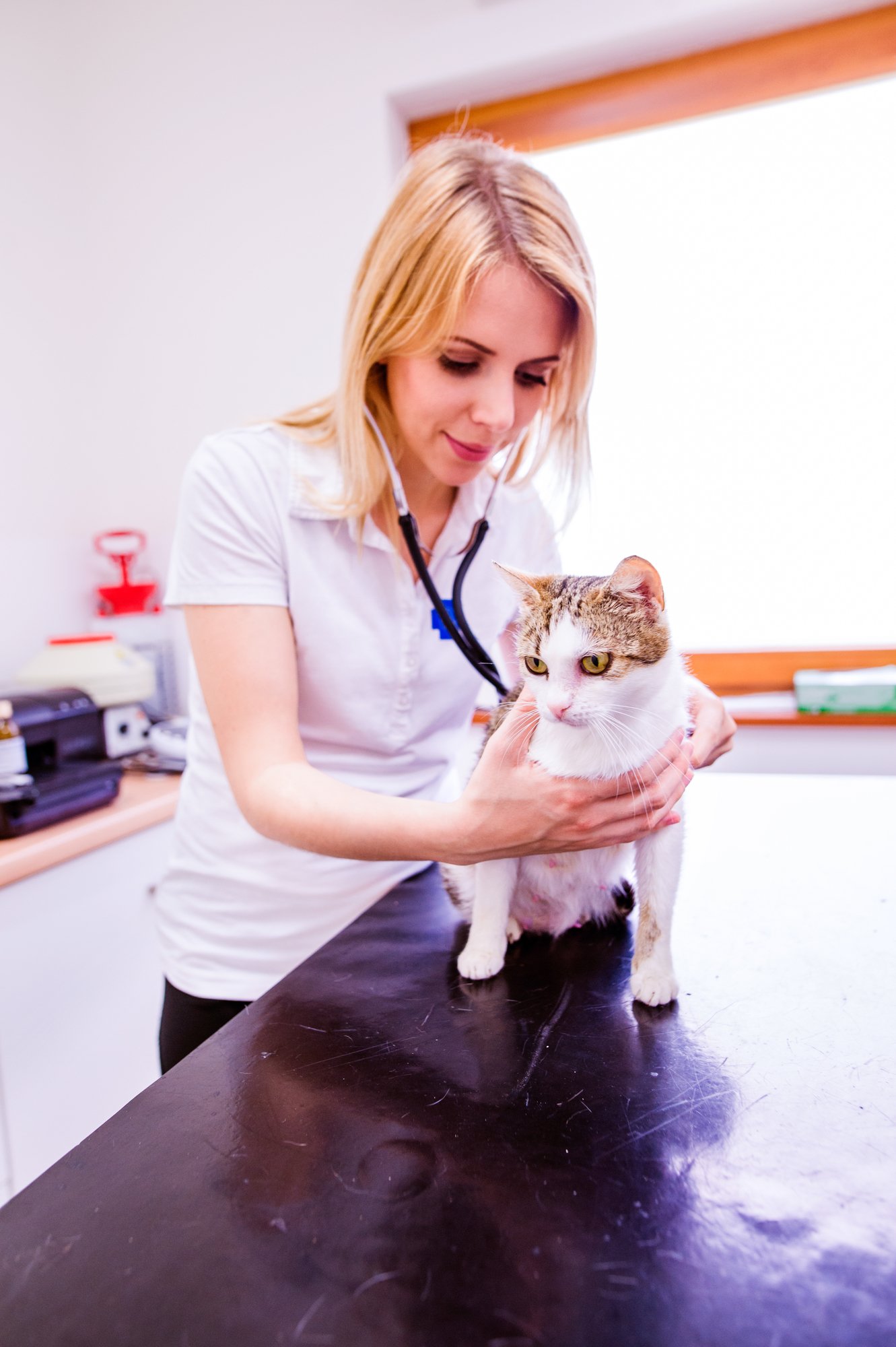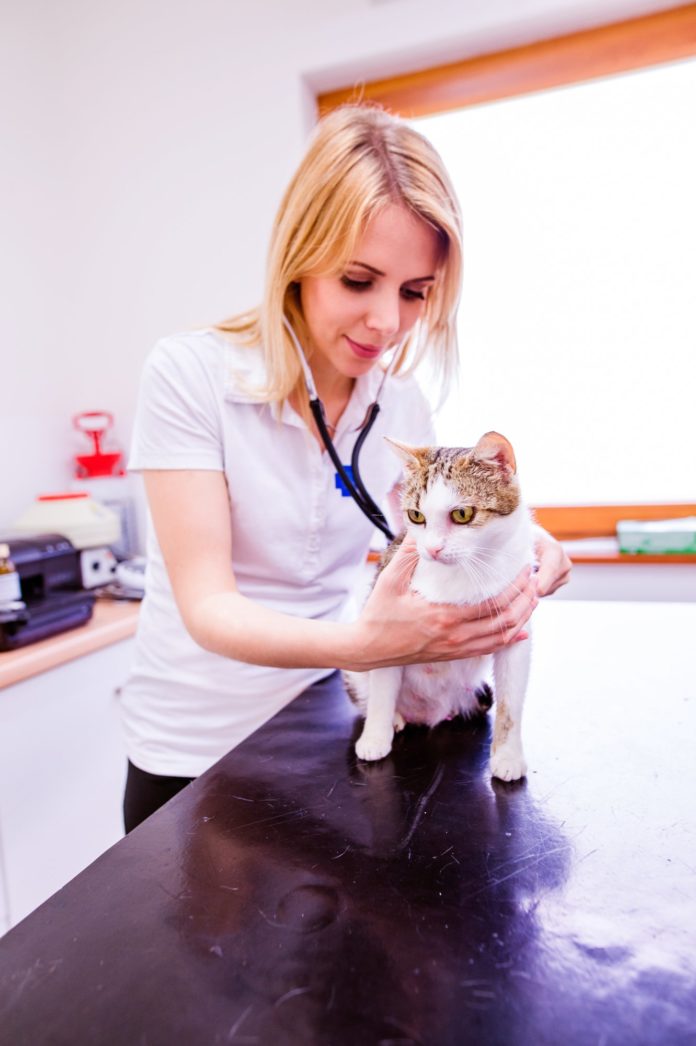
We can’t watch our cats all the time nor can we predict with any degree of certainty what trouble they may seek out. Sometimes, you may not even realize that your cat ate something bad for him. You just have to be on the alert for signs of poisoning:
-Vomiting
-Diarrhea
-Seizures
-Blood in the stool/urine
-Drooling
-Lethargy
-Loss of appetite
-Bruising
-Nosebleeds
-Weakness or collapse
-Irregular heartbeat
-Inability to urinate
-Difficulty breathing
All of these signs can occur for other reasons as well, so consider the situation and any other health concerns that your cat might already be dealing with. For example, a male cat who is unable to urinate is more likely to be experiencing urinary blockage than suffering from poisoning (but both of these are veterinary emergencies!).
Lethargy and a poor appetite come along with many chronic health problems, such as liver of kidney failure. When in doubt, it never hurts to contact your veterinarian with your concerns.
Depending on the poison involved, signs can develop quickly or may take some time. Regardless, if your cat is showing unexplained signs of illness, a veterinary visit is in order to make sure that the problems don’t get worse.
Vomit or Not?
Whether or not vomiting should be induced to make your cat vomit up the illicit snacks depends on what she ate and how long ago. If the substance has had time to move past the stomach, vomiting will no longer be productive, and some substances (such as bleach and drain cleaners) can cause more harm coming back up the esophagus.
In these instances, the best option is usually for your veterinarian to administer an antidote or something like activated charcoal to neutralize the dangerous chemical and prevent it from being absorbed.
A pet-poison helpline is generally the best resource to find out what your cat’s case calls for. Your veterinarian will know what to do for common poisoning scenarios, such as antifreeze, but there are endless products and chemicals out there that are harmful to your cat, and it is impossible to keep up with the best protocols for all of them. Helplines are dedicated to handling pet poisoning cases, so they are often the best resource for the most up-to-date information.
Do not induce vomiting if your cat is already throwing up or showing clinical signs (such as weakness, ataxia, or unconsciousness).
While it may be appropriate to induce vomiting in a cat that has ingested certain toxins, and while recommendations for the use of orally administered hydrogen peroxide to induce vomiting in cats at home have been made in the past, current recommendations are to avoid this practice.
While hydrogen peroxide may induce vomiting in some cats (it works fairly well for this purpose in dogs), most cats will not vomit after ingesting hydrogen peroxide. In addition to this relative lack of effectiveness in inducing vomiting in cats, orally administered hydrogen peroxide may cause gastritis (irritation of the lining of th stomach) and, in some cases, hemorrhage of the gastrointestinal tract. There is also a risk that a cat may accidentally inhale orally administered hydrogen peroxide, which may lead to aspiration pneumonia.
For these reasons, having owners attempt to induce vomiting in a cat at home is not currently recommended. If a cat has ingested a toxin that requires induction of vomiting, this should be undertaken by a veterinarian, so any cat that is deemed to potentially benefit from inducing vomiting should be brought to a veterinarian immediately.
To the Hospital
Your veterinarian has relatively reliable options available to make your cat vomit if the situation requires.
The veterinarian may also administer an antidote if there is one for whatever your cat ate. For other substances, and those that should not be vomited, it may be most appropriate to administer activated charcoal to bind to the chemical and prevent it from being absorbed through your cat’s digestive tract.
Treatment for most poisoning cases will involve supportive care, such as fluid therapy, and bloodwork to monitor organ function. You should expect that your veterinarian will want to do a follow-up exam a day to a week after the event to make sure that your cat is healthy.
With any problem, the earlier your veterinarian can help, the better, but it’s especially important with poisons. Once clinical signs indicate that absorption has occurred, and the more time between ingestion and treatment and the more severe the clinical signs get, the poorer the prognosis.

Keep the Holidays Happy
As we enjoy the holidays, it’s important to think about the not-so-edible seasonal hazards that our kitties might be tempted by.
Poinsettias cause mild toxicity. Your cat may seem nauseous, vomit, or have diarrhea, but he will most likely recover quickly, especially if he only consumes a little of the plant.
Broken ornaments result in sharp fragments. If your cat swallows one of these pieces, it could potentially get lodged in or perforate his digestive tract. Keep fragile ornaments out of your cat’s reach, and/or shut your cat out of the room with the tree.
Tinsel is tempting. Cats love to play with it, but the strands are easily swallowed and can result in intestinal tears or blockage.
Electrical cords are not for biting. Try to run extra cords through areas where your cat is less likely to play with them or put a cat-friendly toy near cords as a distraction.




